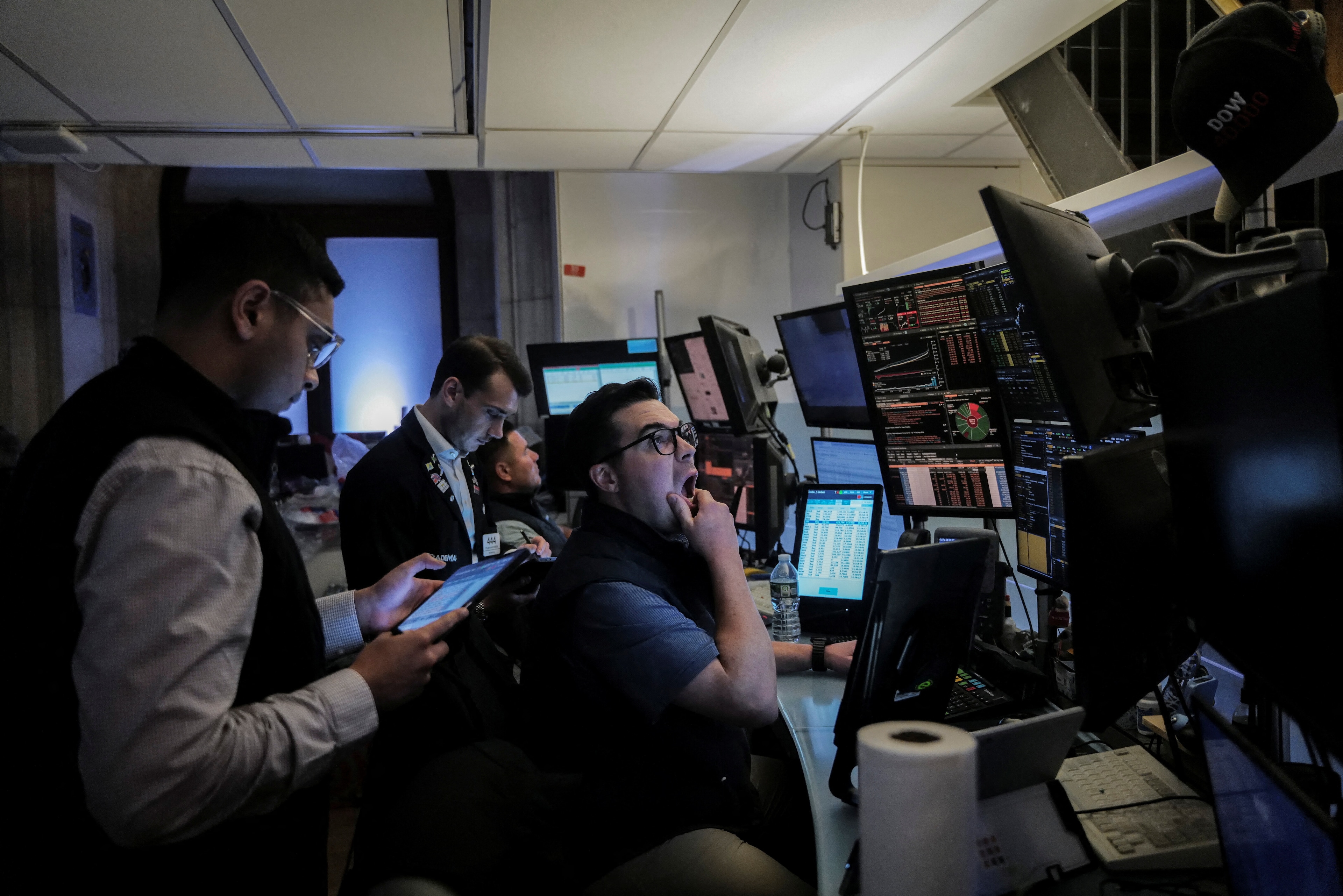Breeding unicorns in Africa: is this the first of many?

Africa is home to six of the world’s 12 fastest growing economies from 2014 to 2017.
Image: REUTERS/George Esiri
Stay up to date:
Africa
While tech “unicorns” coming out of Silicon Valley are starting to sound like a dime a dozen, the first tech unicorn to come out of Africa, Africa Internet Group (AIG), is causing a stir. Growing into a unicorn — a privately held technology company valued at $1 billion or more — is a significant milestone for AIG, says Wharton management professor David Hsu.
“It’s a highly visible, symbolic and substantive marker,” Hsu notes. “It shows that there’s enough by way of demand, as well as a platform that [AIG] is able to put in place to justify that marker.”
Until now, no private tech venture based in Africa has obtained that trophy. In its most recent round of funding, AIG was valued around $1.1 billion with fresh funding from Goldman Sachs, Rocket Internet (AIG’s parent company) and MTN Group, a South Africa-based telecommunications firm. Africa is home to six of the world’s 12 fastest growing economies from 2014 to 2017, according to forecasts from the World Bank’s Global Economic Prospects, so it’s no surprise that the continent finally has its own tech success story, says Katherine Klein, Wharton management professor and vice-dean for the Wharton Social Impact Initiative. “The very label of the first unicorn can convince local and foreign investors that this is possible,” Klein says. “We should see more capital flowing in, slowly but surely.”

Africa’s Amazon?
AIG is the parent company to a network of 10 consumer-driven Internet businesses: Jumia (an e-commerce platform), Zando (shoes and clothing), Hellofood (a food delivery service), Kaymu (an online resale marketplace), Lamudi (a real estate classified platform), EasyTaxi (a cab-hailing service), Jovago (a hotel-booking portal), Everjobs (a jobs classified site) and Carmudi (a car-selling platform). Started in 2012, AIG now operates in 23 African countries.
One of AIG’s main backers is Rocket Internet, the German company that’s been called a start-up clone factory. Rocket’s regional Internet branches are broken down as Africa Internet Group, Middle East Internet Group, Asia Pacific Internet Group and Latin America Internet Group.
AIG’s most successful subsidiary, Jumia, has been likened to an Amazon clone with tweaks to adapt to the African market. Already, Jumia operates in 11 African markets, including Cameroon, Egypt, Ghana, Kenya, Ivory Coast, Morocco, Nigeria and Uganda. “When companies take a concept or venture idea from one country and adapt it to the needs of another country, I call this … ‘creative imitation,’” says Martin Ihrig, an adjunct professor at Wharton and practice professor in the University of Pennsylvania’s Graduate School of Education. “The Africa case is a beautiful illustration of that.”
Ihrig’s research shows that the creative imitation strategy is especially powerful for global entrepreneurs operating in environments with advanced information and communication technology. “Maybe 10 years ago, this wouldn’t have been so easy. Now with the Internet, new venture ideas spread around the globe and it’s easier to replicate them,” Ihrig explains.
In fact, Goldman Sachs earmarked its $326 million investment in the latest round of funding for AIG to be used to grow Jumia. “Goldman Sachs probably looked at the aspects they’re most interested in and what they have the most confidence in,” Ihrig notes. “Jumia must be the gem in the portfolio.”
Another major backer is French insurance giant AXA who put in $83 million in exchange for an 8% stake. The company will also become the exclusive insurance provider for AIG. In an interview with Bloomberg, AIG CEO Jeremy Hodara said the investment from AXA will increase African consumers’ access to insurance products and further AIG’s goal of offering services and products that consumers in its markets cannot acquire locally. “The offline world, or real-world infrastructure in Africa, is simply moving too slowly,” he said. “You cannot find a real-estate company or travel agency or insurance company on every second corner, and our online businesses aim to fill that gap.”
The deal with AXA is mutually beneficial, according to Aubrey Hruby, co-author of The Next Africa: An Emerging Continent Becomes a Global Powerhouse and an advisor to the Wharton Social Impact Initiative. She explains that, in a continent where as much as 60% of people pay for health care out of pocket, the business potential is huge for an insurance company to offer products like car and motorbike insurance as well as crop and climate insurance.
While AIG officials would not divulge valuation or profitability figures for Jumia, the site is experiencing significant growth. In an article for TechCrunch, Jake Bright, who co-authored The Next Africa with Hruby, interviewed AIG co-CEO Sacha Poignonnec, who said Jumia generated about $234 million in revenue during the first nine months of 2015, a 265% growth from 2014. Investors “believe that Africa is an interesting place in terms of its future,” Ihrig says. “They believe that certain parts of it will be highly successful, growing rapidly and exponentially. In the U.S., we see investors valuing companies at high prices that are sometimes hard to understand. In Africa, there’s still considerable risk, but a lot of future consumer demand.”
You can give a long leash for such a venture, adds Hsu. The potential for credit scoring or centralizing information by a financial institution could bring a lot of value to converting customers to AIG’s platform. That data could be used for multiple purposes that could be beneficial for broad financial transactions, Hsu points out.
Moreover, one major barrier to profits in Africa is its infrastructure — and Jumia has found creative ways to circumvent the challenge. Only about one third of Africans live within two kilometers of a paved road that is passable year-round. Transportation costs are five to eight times higher than in other emerging economies like Brazil and Vietnam, according to McKinsey. It’s the last-mile delivery that makes transportation infrastructure so expensive. To overcome such obstacles, Jumia has its own motorbike fleet, explains Hruby, noting that “it’s these types of adaptions that make AIG an extraordinary success and could push the envelope for more businesses to grow.”
Jumia has found the most success in Nigeria, which has a rapidly growing consumer sector powered by an emerging middle class, notes Hruby. Nigeria is Africa’s most populous country with more than 177 million people and is expected to be home to double that number in 25 years, adds Hruby. It’s also Africa’s largest economy based on GDP. According to McKinsey’s Global Institute, trade in Nigeria is expected to increase by an average of 8% a year, tripling to $1.4 trillion a year by 2030 and become the largest sector of the country’s economy.
Crude oil accounts for 90% of Nigeria’s exports and bolsters about 75% of the government’s consolidated budgetary revenues, according to the World Bank. But despite the downturn in oil prices, consumers still need staples, notes Ihrig. “Imports will be more expensive as oil prices slide, which will make firms shift to locally made goods,” adds Hruby.
More Froth to Come?
AIG isn’t the only tech venture in Africa bubbling up to the billion-dollar level.
“Interswitch is an important one,” says Hruby. Founded in Nigeria in 2002 by Mitchell Elegbe, Interswitch processes digital bank payments and owns a debit-card provider. A London-based private-equity firm, Helios Investment Partners, is one of its main backers, paying $96 million in 2010 for a 52% stake. Helios said in February that it plans to sell its stake in Interswitch, which is expected to attract strong investor interest.
According to a Bloomberg report from June, Interswitch is considering IPOs in London and Lagos later this year. By going public in both countries, the firm will have greater access to more capital markets. Listing locally in Nigeria may be for political reasons, says Hruby, but the company can raise the majority of the needed capital externally by demonstrating it can meet British regulatory standards — something that will give investors a lot of confidence, adds Hruby.
Hruby notes that entrepreneurs who have worked at AIG have also left to start their own ventures, similar to the “PayPal mafia” that spawned YouTube, Yelp and LinkedIn. Africa Courier Express (ACE), an e-commerce logistics start-up, and SureGifts, a gift-card retailer, were both started by former Jumia employees. Ihrig points out that at least in the offline world “there are usually two to three players that coexist in a market, like McDonald’s and Burger King or Chipotle and Qdoba.” In a place like Africa, with financial markets and transportation infrastructure still in its infancy, all of these fledgling firms need each other to build out the sector, Hruby points out.
Another adaption to the African market is Jumia’s option of accepting cash on delivery instead of pre-paying by credit cards, the practice Amazon generally uses. Klein explains that Jumia has been more “astute in how they adapt to the African market.” She notes that people are more comfortable exchanging products for cash, like in a street market.
Hsu points out that India has the same sort of cash culture and Indian tech “unicorn” Snapdeal, an Amazon-like clone founded by Kunal Bahl, has had to adapt its payment models as well. “If there’s a profit motive, it’s a powerful mechanism to foster innovation to overcome some of these challenges, and not taking these [financial models] as fixed,” says Hsu. Moreover, Hruby points out that Chinese firm Alibaba has experience in entering emerging markets without a heavy dependence on credit cards.
Though sub-Saharan Africa leads the world in consumers having mobile money accounts, only 12% of adults have one, compared to 2% worldwide, according to the World Bank. Of that 12% figure, 45% use only a mobile money account to do their banking. According to the World Bank’s Global Findex Data in 2014, only 34% of adults in sub-Saharan Africa had a bank account at all so that leaves the majority of people without any link to a mainstream financial institution.
“Cash is still king,” says Hruby. In Nigeria, there’s a cultural norm of a cash culture where people still buy houses and cars with suitcases of cash, explains Hruby. In Kenya, M-Pesa, a mobile money platform started by a telecom company, is becoming the norm, but Nigeria is behind Kenya in mobile payments. In Nigeria, they “do credit card sales or cash but very little mobile money,” adds Hruby. People still don’t trust the credit card system because online fraud is rampant.
What’s Next?
Amazon itself hasn’t really gotten a foothold in Africa, letting the upstarts figure out how to handle the logistical challenges first, like figuring out infrastructure issues and financial payments. “The interesting question is: What will Amazon do? Will they buy Jumia or go into the African market themselves?” notes Ihrig. Rocket Internet co-founders the Samwer brothers also have experience in selling their clones to the companies they got the ideas from: eBay bought its clone Alando from Rocket Internet in 1999. Another question to ask, says Hruby, is what will Alibaba do, since the Chinese company is more experienced in going into emerging markets.
But AIG has first-mover advantage, notes Hruby. Also, Klein adds, “Unless you have a lot of in-depth knowledge of local countries, it’s not so easy to build a brand that’s attractive.”
Don't miss any update on this topic
Create a free account and access your personalized content collection with our latest publications and analyses.
License and Republishing
World Economic Forum articles may be republished in accordance with the Creative Commons Attribution-NonCommercial-NoDerivatives 4.0 International Public License, and in accordance with our Terms of Use.
The views expressed in this article are those of the author alone and not the World Economic Forum.
Forum Stories newsletter
Bringing you weekly curated insights and analysis on the global issues that matter.
More on Economic GrowthSee all
Chavalit Frederick Tsao
August 19, 2025
Laurel Taylor
August 18, 2025
Yufang Jia and William Jernigan
August 18, 2025
Antara Choudhury and Vivin Rajasekharan Nair
August 14, 2025
Atul Kumar
August 12, 2025




